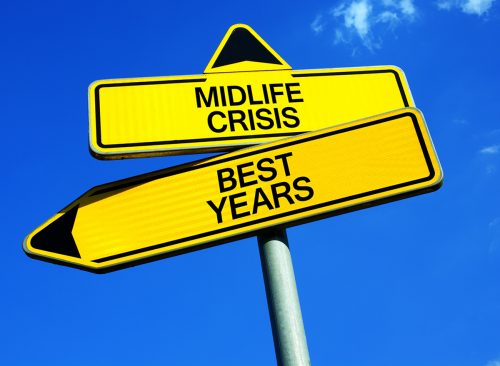20 Subtle Signs of a Midlife Crisis
Are you going through a midlife crisis? Here are 19 subtle signs to look out for.

As much as some of us would like to be, the midlife crisis isn’t a myth. In the ’70s, psychologists Daniel Levinson and Roger Gould named the phenomenon after years of study. (By 2005, the idea had become so ingrained in the culture that producers of The Office gave their names to Jan Levinson-Gould, the buttoned-down executive who went comically off the rails.) But crises at this stage of life aren’t exactly rare—and they aren’t always funny—as many of us question where we are and how we’re adjusting to life’s challenges. These are subtle signs of a midlife crisis.

“A midlife ‘crisis’ may actually come as more of a subtle, low-key sense of dissatisfaction,” gerontology expert Kathryn Betts Adams, Ph.D., told Men’s Health. You may be looking back at your life with regrets and wondering if you’re heading in the right direction.

You may have a heightened awareness that life is short and worry about growing older.

You might suddenly want to look and feel younger, changing your hairstyle, grooming, or clothes.

You may be drawn toward risky behaviors, such as the use of substances, having extramarital affairs, or overspending money. “Some people engage in these behaviors to numb the pain and distract themselves from the problem at hand,” says Permanente Medicine.

You may re-evaluate your past life choices and wonder if you made the right decisions.

You may experience a sudden desire for adventure or new experiences, like taking up extreme sports or traveling. “Our brains thrive on novelty, so a rebellion against monotony is almost a survival instinct,” Bruce Frankel, author of What Should I Do With The Rest Of My Life?, told Men’s Health.

You may lose interest in activities or hobbies you previously enjoyed. “Catching yourself feeling like you’re running on autopilot with no goal in sight can be disheartening,” Arno Marcus of iCareerSolutions told Forbes. “Don’t despair. Take this opportunity to slow down, reassess your wishes, and course correct.”

You may feel unfulfilled at work and contemplate making career changes or quitting your job.

You may want to mix up the people around you, seeking out new friends or distancing yourself from old friends and family.

You may want to shell out extravagant purchases. “Many mid-life crises showcase spectacular splurges such as a new car. While this might temporarily placate, it’s not the answer,” said Lauren DeCarlo of Career Directors International in Forbes. Stretching yourself into new experiences and skills can provide the novelty you need with more satisfaction.

Romanticizing the past often comes with a midlife crisis; you might feel nostalgic for your youth and view the present as inferior in comparison.

You may participate in activities typically associated with youth, like clubbing or partying.

You may develop a sudden interest in physical fitness or appearance, including diets, exercise, or plastic surgery. Don’t take it too far. “Some people will go to extremes trying to achieve a look of youth or perfection,” said psychiatrist Robi Ludwig in Women’s Day. “Sadly, they tend to ruin themselves — it’s like that false plant that is too green and too perfect.”

“People should never give up on themselves, but if they do, they’re probably more inclined to experience a midlife crisis,” says Ludwig. She advises finding an aging role model, someone who’s aged well that you admire.

You may feel restless and easily bored. “Boredom — feeling passionless — can be a sign of a midlife crisis,” says Ludwig. “The pressures of adulthood can weigh people down at this time — they can feel stuck in a rut — where the opportunity to introduce fun for fun’s sake can get lost.”

You may question the quality of your relationships, such as the stability of a marriage or partnership.

It’s common to question the meaning of life and your purpose in it. “One of the things that can happen and identify the onset of a midlife crisis is feeling ill-fit for the life you’re leading,” said Ludwig.

You might increasingly need approval from other people to boost your self-esteem.

You may experience mood swings, including periods of depression, anxiety, or anger.
RELATED: 20 Signs You May Have the New COVID Variant

“The loss of a wish, the loss of the idea of who you wanted to be — it’s a confrontation with reality that can leave people feeling disappointed and unsettled,” said Ludwig. Remember: It’s never too late to set new goals.














